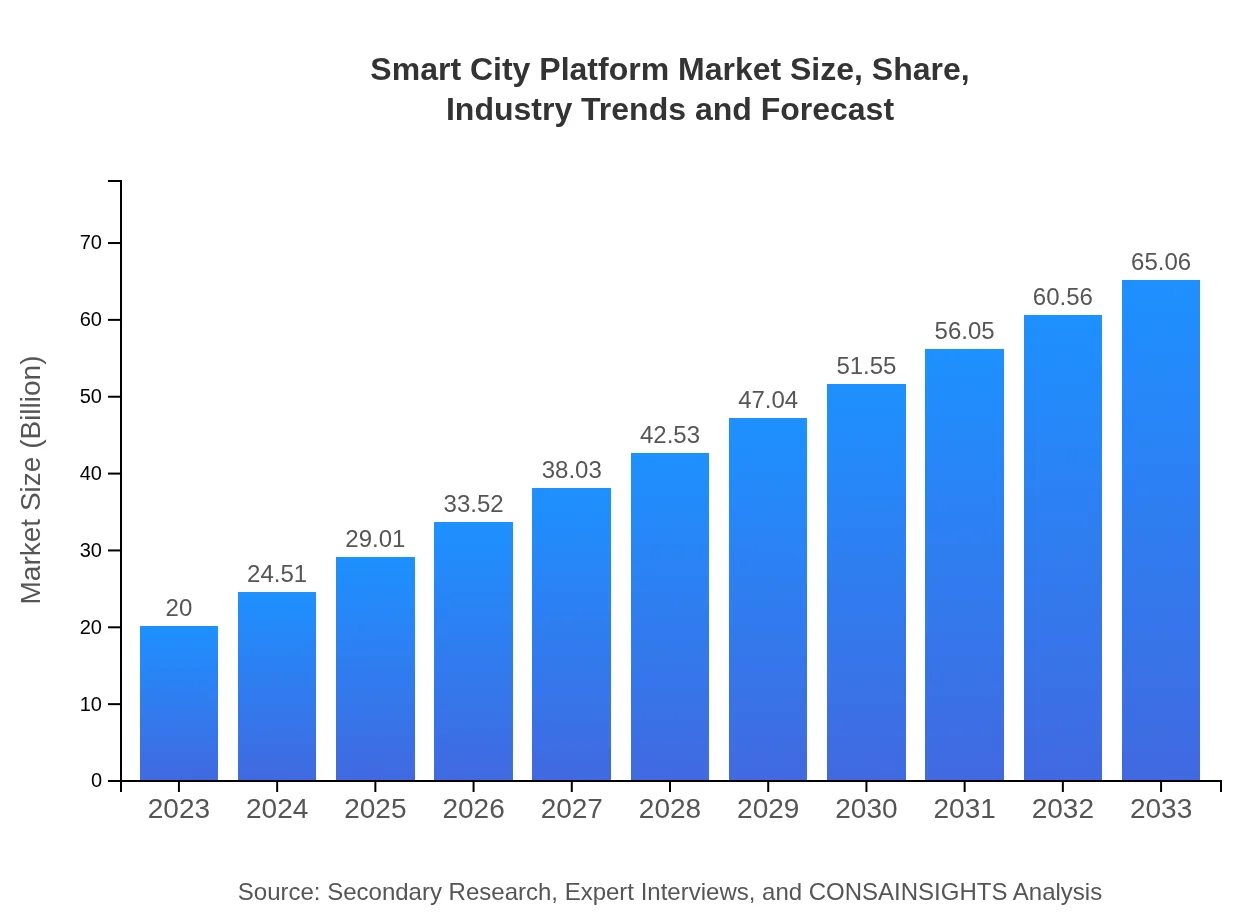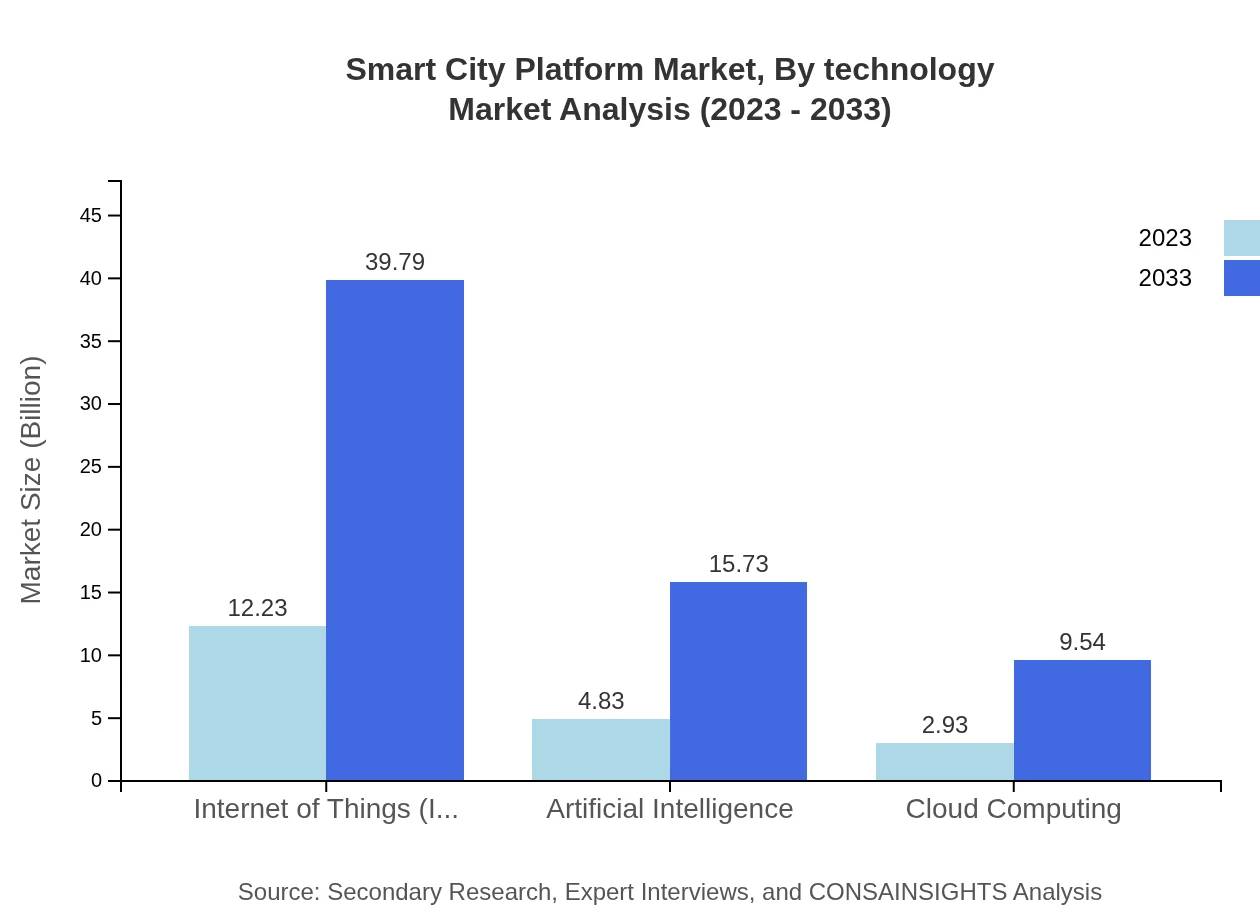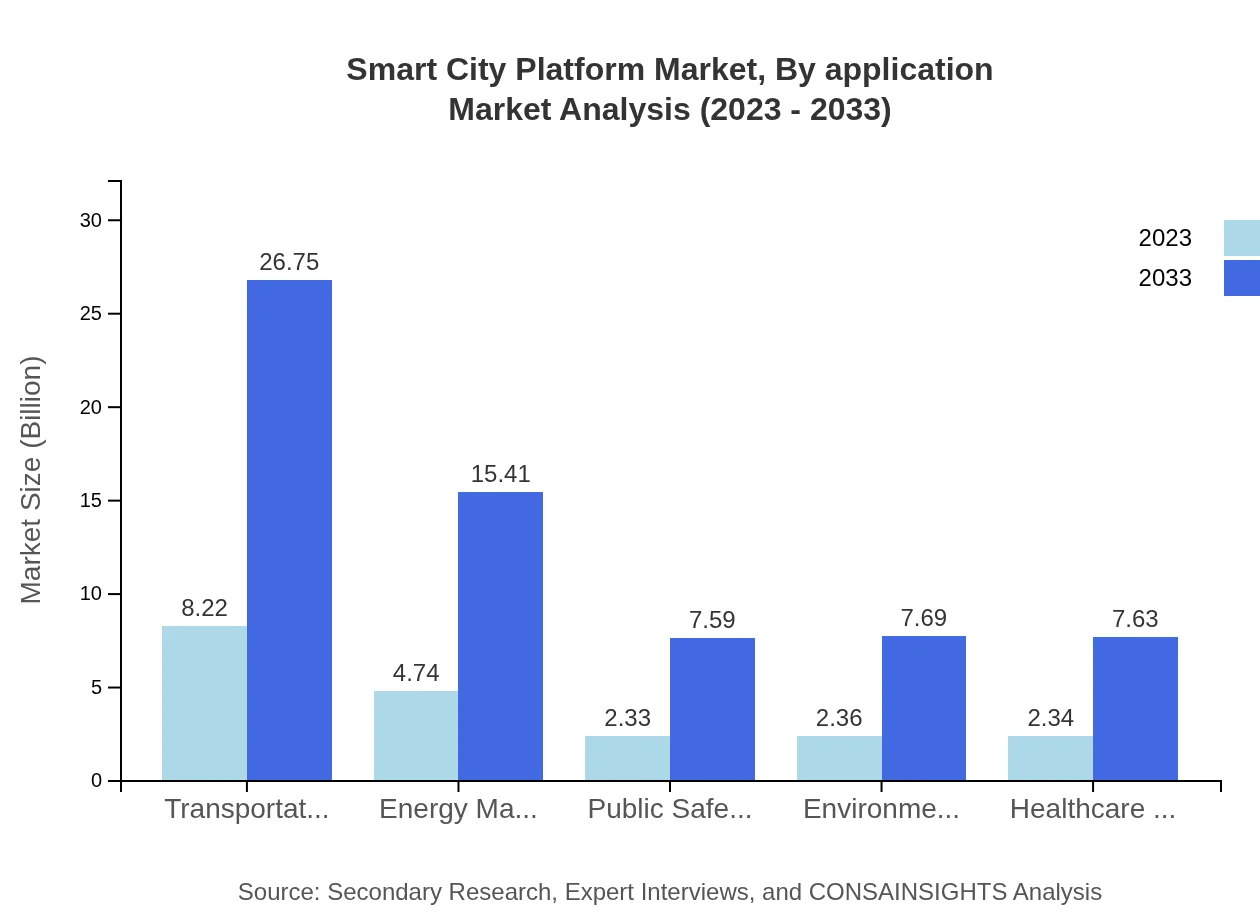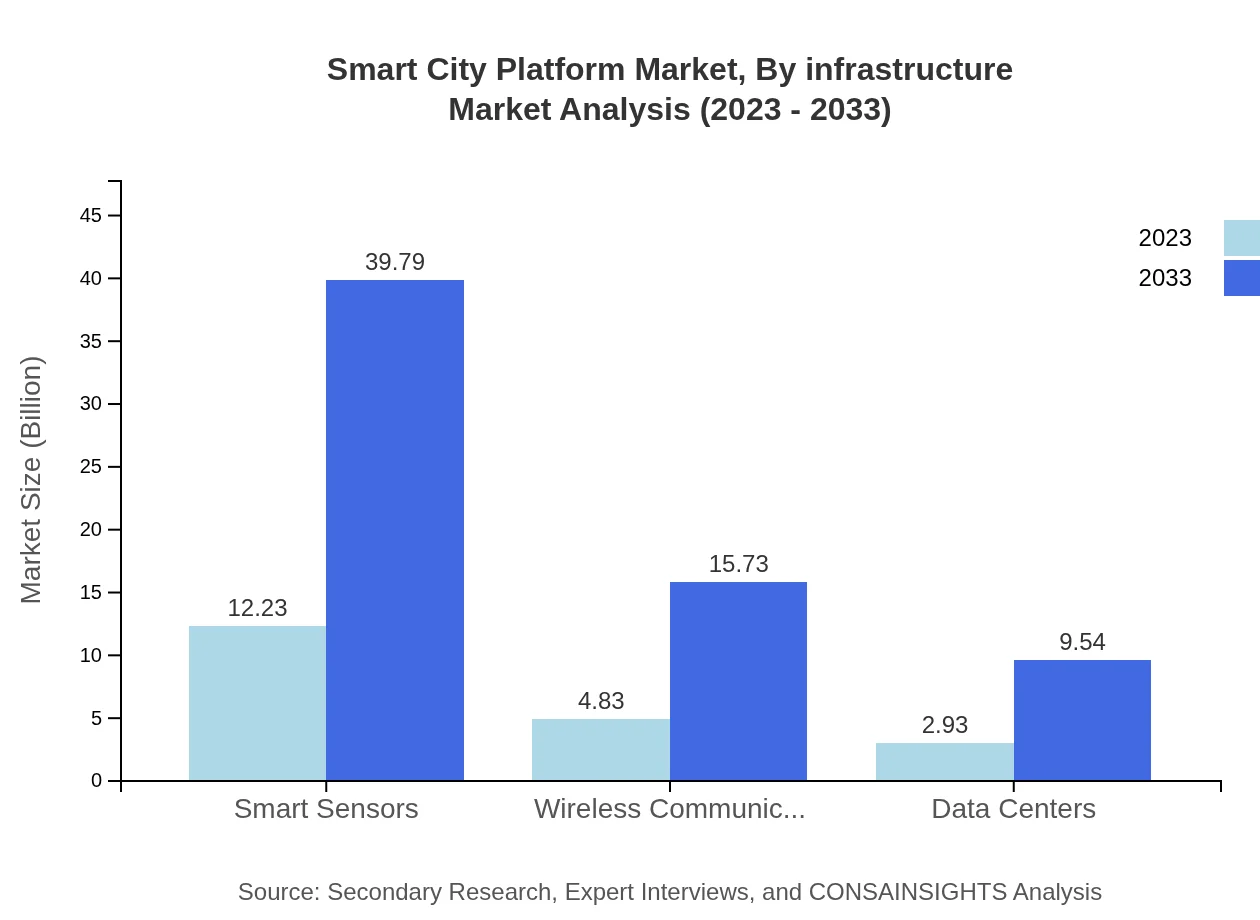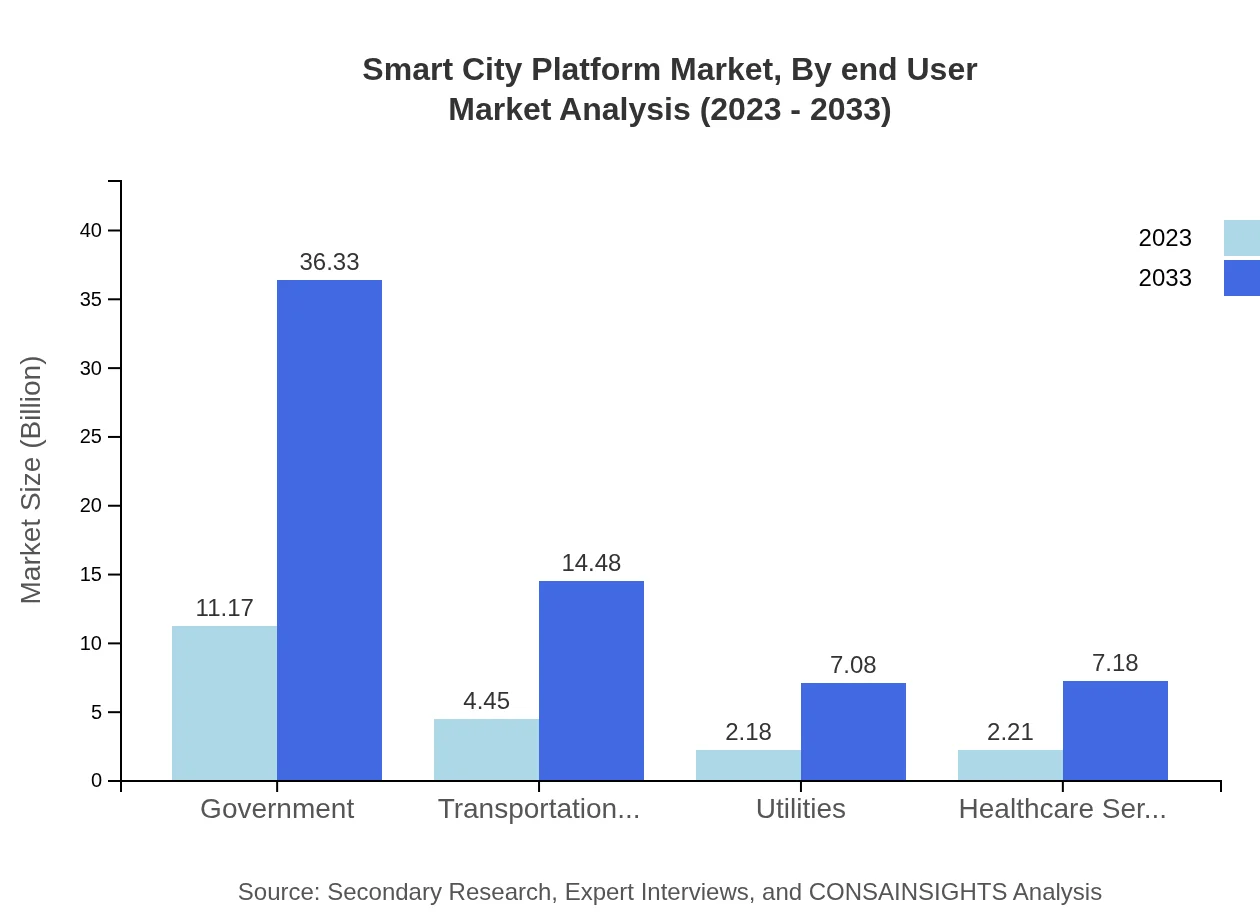Smart City Platform Market Report
Published Date: 31 January 2026 | Report Code: smart-city-platform
Smart City Platform Market Size, Share, Industry Trends and Forecast to 2033
This report covers the comprehensive analysis of the Smart City Platform market, offering insights into market size, trends, forecasts, and key players from 2023 to 2033.
| Metric | Value |
|---|---|
| Study Period | 2023 - 2033 |
| 2023 Market Size | $20.00 Billion |
| CAGR (2023-2033) | 12% |
| 2033 Market Size | $65.06 Billion |
| Top Companies | Siemens AG, Cisco Systems, Inc., IBM Corporation, Schneider Electric |
| Last Modified Date | 31 January 2026 |
Smart City Platform Market Overview
Customize Smart City Platform Market Report market research report
- ✔ Get in-depth analysis of Smart City Platform market size, growth, and forecasts.
- ✔ Understand Smart City Platform's regional dynamics and industry-specific trends.
- ✔ Identify potential applications, end-user demand, and growth segments in Smart City Platform
What is the Market Size & CAGR of Smart City Platform market in 2023?
Smart City Platform Industry Analysis
Smart City Platform Market Segmentation and Scope
Tell us your focus area and get a customized research report.
Smart City Platform Market Analysis Report by Region
Europe Smart City Platform Market Report:
Europe’s Smart City Platform market is expected to expand from $6.31 billion in 2023 to $20.53 billion by 2033. The region leads in implementing various smart solutions aimed at sustainable development and efficient urban management, supported by EU policies promoting intelligent infrastructure.Asia Pacific Smart City Platform Market Report:
In the Asia Pacific region, the Smart City Platform market was valued at $3.47 billion in 2023, with expectations to reach $11.28 billion by 2033. Governments in countries like China and India are increasingly investing in smart city projects, supported by initiatives to improve infrastructure and urban living conditions.North America Smart City Platform Market Report:
North America shows strong growth potential, with a market size of $7.47 billion in 2023 projected to rise to $24.31 billion by 2033. The region's focus on sustainability and government-driven initiatives to improve public services propel significant investments in smart city technologies.South America Smart City Platform Market Report:
The South American market, valued at $1.99 billion in 2023, is projected to grow to $6.47 billion by 2033. The adoption of smart city technologies is sluggish but gaining pace, primarily driven by improvements in public transportation and energy management systems.Middle East & Africa Smart City Platform Market Report:
The Middle East and Africa market is characterized by gradual adoption, beginning at a value of $0.76 billion in 2023 and expected to reach $2.47 billion by 2033. Increasing urbanization and investment in smart infrastructure are key growth factors in this region.Tell us your focus area and get a customized research report.
Smart City Platform Market Analysis By Technology
The adoption of technologies in the Smart City Platform market is diverse, with the Internet of Things (IoT) leading with a market size of $12.23 billion in 2023, projected to grow to $39.79 billion by 2033. Artificial Intelligence and Smart Sensors play a pivotal role in data analytics and infrastructure management while Cloud Computing supports the overarching framework for data storage and access. Overall, reliance on technology enhances the effectiveness of urban management.
Smart City Platform Market Analysis By Application
Applications within the Smart City Platform segment include Transportation Management, Utilities, and Healthcare Services. Transportation Management is valued at $8.22 billion in 2023, expected to grow to $26.75 billion by 2033, showcasing the impact of smart solutions on urban transit systems. Other sectors like Healthcare Services and Environmental Monitoring also contribute substantially through sustainability initiatives.
Smart City Platform Market Analysis By Infrastructure
Infrastructure expenditure focuses on enabling smart services and enhancing connectivity, with significant investments directed towards data centers, roads, and communication networks. Infrastructure developments in the Smart City Platform are expected to advance city resilience, support economic growth, and improve public services, thereby fostering broader adoption of smart technologies.
Smart City Platform Market Analysis By End User
Key end-users characterized in this market include government bodies, transportation sectors, and utilities. Government services lead as a market segment, valued at $11.17 billion in 2023 and anticipated to reach $36.33 billion by 2033, highlighting the significant role of governmental initiatives in driving smart city projects.
Smart City Platform Market Trends and Future Forecast
Tell us your focus area and get a customized research report.
Global Market Leaders and Top Companies in Smart City Platform Industry
Siemens AG:
A leading global engineering company, Siemens provides innovative solutions for urban infrastructure, focusing on sustainable transportation and smart energy management systems.Cisco Systems, Inc.:
Cisco develops advanced networking and cloud-based solutions that empower cities to enhance connectivity and optimize infrastructure through intelligent data management.IBM Corporation:
IBM offers a range of smart city solutions utilizing AI and data analytics to improve urban governance and citizen engagement, leading to enhanced service delivery.Schneider Electric:
Specializes in energy management and automation solutions, Schneider Electric supports smart city initiatives with a focus on sustainability and efficiency.We're grateful to work with incredible clients.









FAQs
What is the market size of Smart City Platform?
The Smart City Platform is projected to reach a market size of $20 billion by 2033, growing at a CAGR of 12% from 2023. This rapid growth indicates increasing investments in smart technologies and urban sustainability.
What are the key market players or companies in Smart City Platform industry?
Key players in the Smart City Platform industry include major technology firms and urban service providers focusing on IoT, AI, and data analytics to enhance city management and infrastructure efficiency.
What are the primary factors driving the growth in the Smart City Platform industry?
The growth of the Smart City Platform industry is driven by urbanization, government initiatives for smart infrastructure, advancements in IoT technology, and the need for sustainable urban development solutions.
Which region is the fastest Growing in the Smart City Platform?
North America is the fastest-growing region, expected to reach a market size of $24.31 billion by 2033, followed by Europe at $20.53 billion, highlighting significant investments in smart city initiatives across these regions.
Does ConsaInsights provide customized market report data for the Smart City Platform industry?
Yes, ConsaInsights offers customized market report data tailored to specific needs within the Smart City Platform industry, allowing companies to obtain precise insights that suit their strategic requirements.
What deliverables can I expect from this Smart City Platform market research project?
Deliverables from the Smart City Platform market research project include detailed market analysis reports, growth forecasts, competitive landscape assessments, and insights into regional and segment performance.
What are the market trends of Smart City Platform?
Current market trends for Smart City Platforms include increased reliance on IoT devices, integration of AI for predictive analytics, and a shift towards sustainable development practices in urban planning.

